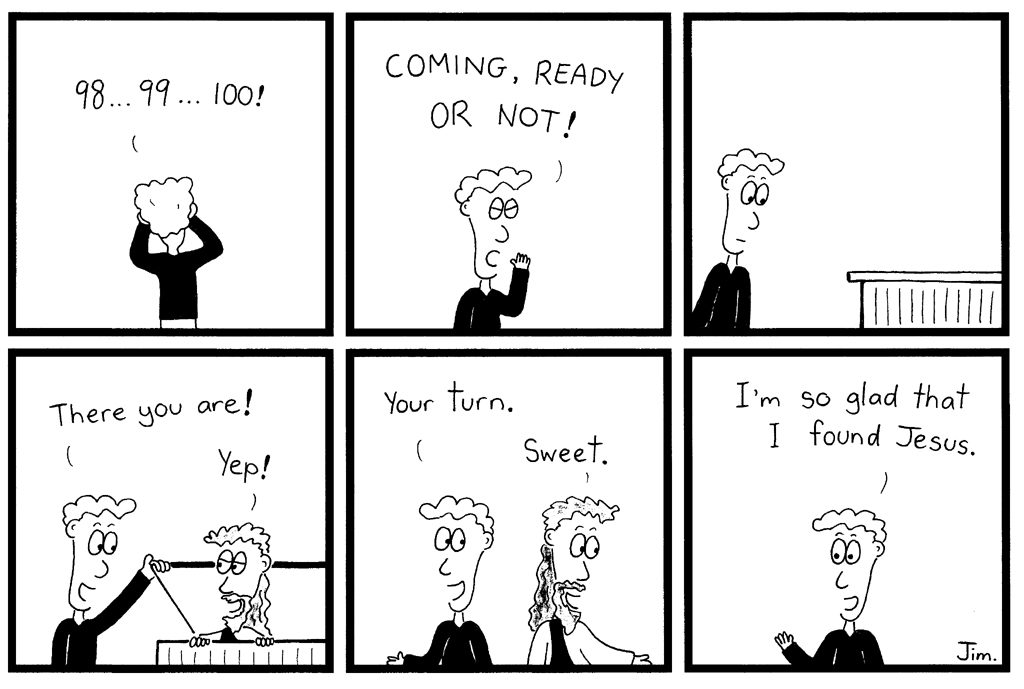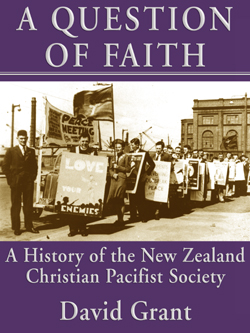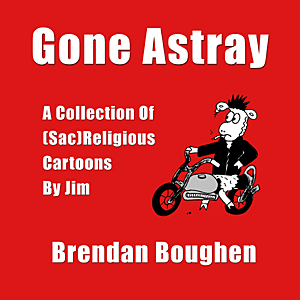
Category Archives: Special Offers


Free Cartoon 2 – From Gone Astray
There are lots more church related cartoons in Brendan Boughen’s (Jim’s) book Gone Astray
Click here for Print books
& here for eBooks (Kindle, ePub and PDF).

Free cartoon 1: from Sounds Like a Game Changer
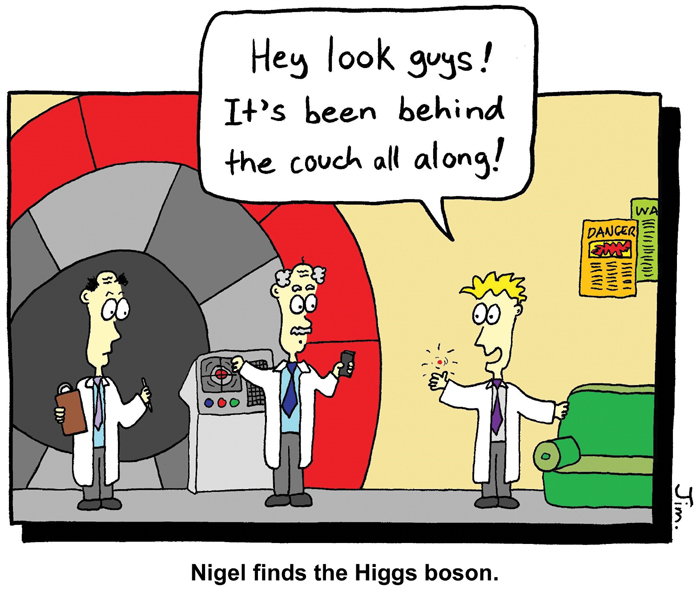
There are lots more tech related cartoons in Brendan Boughen’s (Jim’s) book Sounds Like a Game Changer.
 Click here for Print books
Click here for Print books
& here for eBooks (Kindle, ePub and PDF).
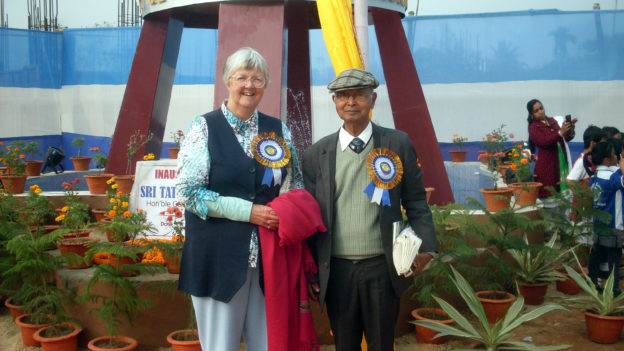
Free PDF – Pat Booth returns to India 2018
The story of Pat Booth’s return trip to India in January 2018
Pat Booth, author of Pat’s India, returned to India in January 2018 for the 75th anniversary celebration of St Paul’s School, in Agartala, Tripura state. She also visited Darjeeling and Kolkata.
Click the link to download a Free 18 page PDF booklet about her fascinating trip.
https://pgpl.co.nz/wp-content/uploads/Pats_India_Return_to_India_2018-16_Nov_2018.pdf
Here are some of her photos:
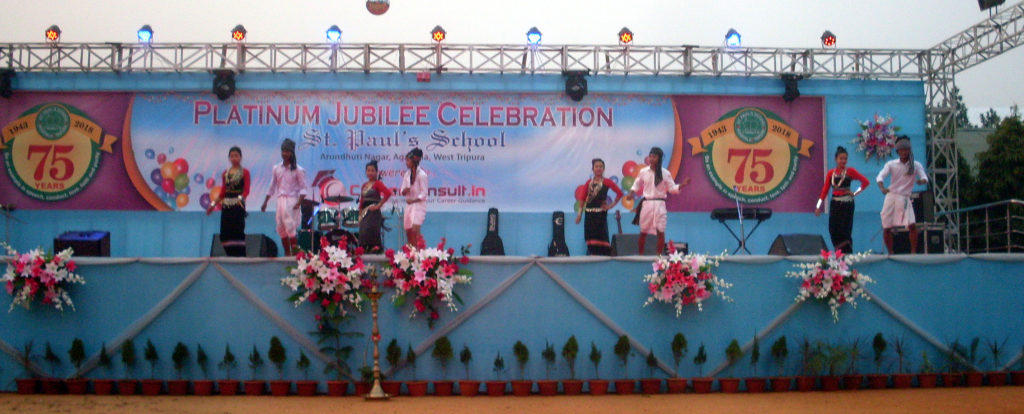 Dancers perform at 75th celebrations
Dancers perform at 75th celebrations
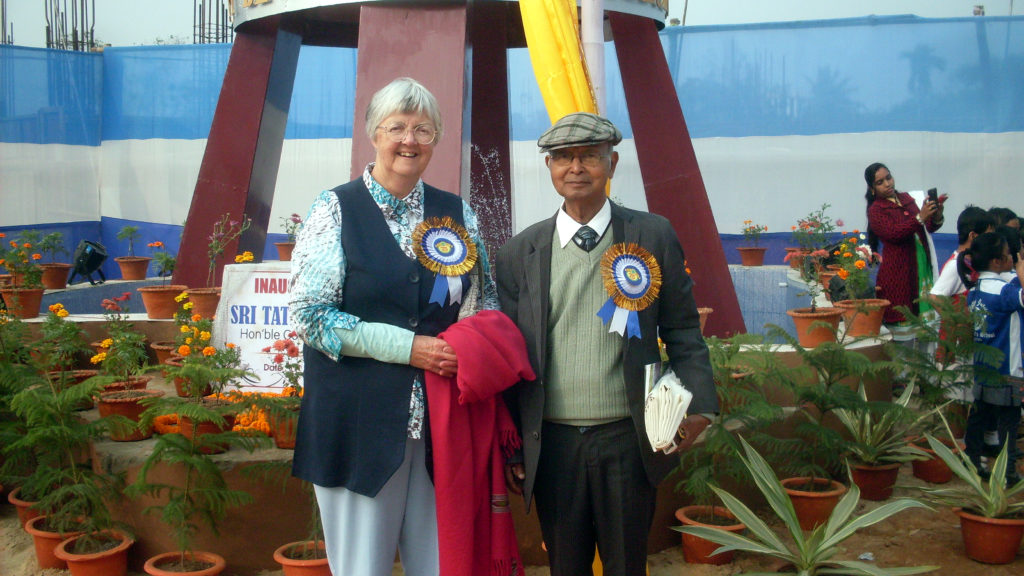 Pat with Lalbulliana Rokhum, first Indian principal of St Paul’s School
Pat with Lalbulliana Rokhum, first Indian principal of St Paul’s School
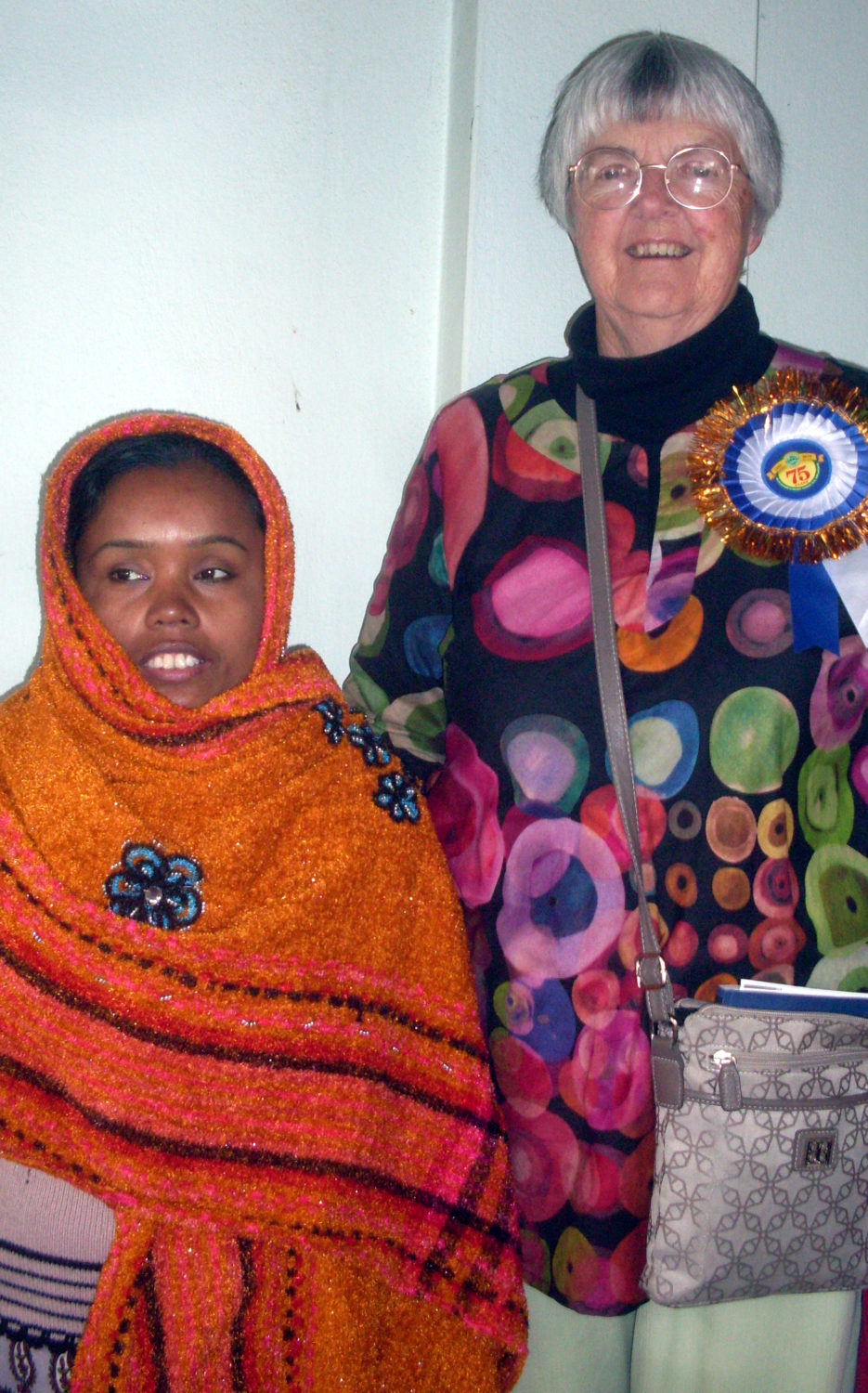 Pat & Konica (a former St Paul’s primary school pupil) at the Kiwi House on the Tripura Baptist Christian Union site at AD Nagar.
Pat & Konica (a former St Paul’s primary school pupil) at the Kiwi House on the Tripura Baptist Christian Union site at AD Nagar.
Order your copy of Pat’s India
Click here for the print edition and here for the eBook editions

Free Sample Chapter: A Tent in the Bush by Fraser Boyd
 Chapter 5 — The Madcap Adventure Starts
Chapter 5 — The Madcap Adventure Starts
Jeanie’s lunchtime investigation of how they might arrange their voyage to New Zealand had resulted in forms to fill in and an interview with the New Zealand Government’s “agent.” This man travelled around Scotland visiting pubs and other community gathering places to try to encourage people to go to the colonies. So, over the next few weeks, William and Jeanie met with him, then started to make arrangements to go to London to board the ship that would take them to New Zealand.
One thing that made them wonder, then laugh out loud, was William’s occupation. William was a miner, and was happy to be a miner in New Zealand, but, the agent told them, “there is no employment for miners in New Zealand. If you want to guarantee to be accepted on the immigration plan, put yourself down as a Farm Labourer. There is a desperate shortage of farm labourers in New Zealand. As you will be paying most of your fare yourself, you can change jobs when you get there, and do anything you want to.”
Eliza was a little worried about this, “How do we know that is not a trap to get you out there so that you can be taken off to some slavery type of job?”
The men all laughed at this, William pointing out that he had been in a “slavery type of job” for all his working life, and actually enjoyed the work and the people he worked with. The only thing he didn’t enjoy was having to have a bath each night before he was able to sit down on his own chair. Maybe farm labourers didn’t get so filthy that they had to wash every day before they could relax in their own home.
That seemed to settle the argument. As James gently pointed out to Eliza, she had trapped herself when she started to talk about slavery in the mines and such things. It was obvious that she was manufacturing arguments that even she did not believe in.
So time and preparation went on. The agent told them that, if they paid their own fare, they had more choices than if they took up the New Zealand government’s offer to pay it for them. At £29, it would take up all their savings, but they felt it would be worth it for the independence it gave them. If they accepted the Government’s fare offer, they would be told where to work, and what to work at, and may not get a land grant.
“Ownership of land is,” the agent said, “the main reason most people go to any of the colonies. The land here is so tied up that there is little hope of anyone outside of the landed families or businessmen being able to buy any. But if you pay your own way out to New Zealand, I can guarantee that you will receive a grant of at least twenty acres.”
Twenty acres seemed to William and Jeanie to be a major reason to emigrate, regardless of all the other reasons they had, which they admitted were mainly emotional.
So they signed up, collected their savings together, found that they would still have something left after paying their £29, and decided that everything was working for them. They were surprised to find that, when they totted up the money they received from selling their furniture, plus a little that both parents were delighted to be able to give them, they were still quite well off. But they did not tell anybody that they had a purse of money. If nothing else, there was the fear of robbery on the journey out.
So on the 11th of August 1875, William and Jeanie boarded a coach in Stevenston, which would take them in a few hours to Glasgow, where they were to catch a train to London. In many ways, Jeanie thought, this could be the scariest part of the whole journey, they had to find their way around Glasgow to catch the train, then get off it in London and make their way to the wharves, and find their ship and so on. Once they were on board the ship all that was needed was to hold on tight so that you did not get thrown overboard. That was how Jeanie envisaged the journey, but stopped worrying after they had been on the road for just a few minutes.
William had no more experience of travel in Scotland and England than Jeanie had, but he seemed to be confident. He told Jeanie some of the stories that he had heard from his mother about her and her husband’s trip from Ireland to Scotland, and how she and James had worked day by day to earn food and lodging, and how good people had been to them.
“There are always good people around,” he told Jeanie confidently, “and if we ever get into distress I am sure that they will help us as they did my mother and father.”
Jeanie was not quite so confident, but asked James to tell her some of the stories so that she could better understand the trials and the triumphs they could expect on this journey. He was happy to do this, partly to divert both their minds from the understandable apprehensions, and partly because he was genuinely proud of the things his parents had done to get to where they now were.
The need for help from good people soon became apparent.
The coach driver was surly, to say the least. He didn’t like loading their luggage on his coach, and then expected William to unload it in Glasgow. By the time they had got their bags down when the coach stopped at the Glasgow Railway Station, they could hear what they thought might have been their train hooting at the platform. Rushing in to the ticket office, they asked for two third class tickets to London, to be asked when they were travelling.
“Now,” said William. “We are going to London to board a ship to take us to New Zealand.”
“Not today you’re not,” the ticket seller told them. “Train to London’s just gone, next one’s in the morning, unless you want to take the milk train, which leaves at 7.00 pm and takes about double the time, stops at every little stop along the way.”
“I don’t think so,” William said, “although we do need somewhere to sleep. Maybe sleeping on the slow train will provide that necessity. If I buy our tickets now, will they be good on tomorrow’s train?”
“Yes, they are good for any train to London. Morning one leaves at 8.00 am sharp, and takes a little under 10 hours. You had better be on it or that will be the end of your trip to New Zealand.”
William paid for the tickets, and they moved back from the ticket office. A long queue had formed during their discussion with the ticket seller, making them embarrassed by some of the muttering going on in the queue.
“What now?”
Neither said it, but both thought it, and were wondering where to turn for help, and to find lodging for the night, or whether they should take the slow train which the ticket seller had been at pains to tell them to avoid. Suddenly a man and lady who had been a few people behind them in the ticket queue came to them, apologised for listening to their conversation with the ticket seller, and asked what they were going to do now that they had missed their train.
“I think we need lodging for the night,” William said, “but this town is not known to us, so we don’t know where to start looking.”
“We heard you say about going to New Zealand,” the man said, “Our son and his wife and children went there just a few months ago, we’re not even sure that they have arrived there yet but they should have done. But you could have their room in our house for the night if you would like it.”
Jeanie looked at the lady with gratitude in her eyes. Her look made it obvious that they were delighted to accept the offer.
“Where were you buying tickets to?” Jeanie asked, to be told, “we go to see our daughter and her family in Stevenston most Sunday afternoons, and always like to get the coach tickets early. Did you know that you can buy coach tickets at the railway station? Having the tickets means that we can get straight on the coach without the need to queue, or to hurry.”
Obviously, the next question was, “Who is your daughter?”
This led to introductions. Their new friends were Mr and Mrs McTavish and their daughter was Ailsa. She was known slightly to Jeanie through her occasional visits to the milliner’s, but her husband worked in the Post Office in Stevenston and as neither Jeanie nor William had much call to go there, they did not know him. Jeanie and William introduced themselves, and picked up their bags ready to walk back to their benefactors’ home. Mr McTavish insisted on carrying Jeanie’s bag, which William had picked up along with his own.
The McTavish house was barely five minutes’ walk away. To judge from the scrubbed exterior, especially the front step, it was likely to be the cleanest and tidiest place they had ever seen. They were not to be disappointed.
Mrs McTavish said, as she noticed them looking around, “One thing about living here rather than in Stevenston is that it is easy to keep a house clean. We don’t have that coal dust and factory smoke that hangs around there all the time. Does that have anything to do with why you are leaving?”
So Jeanie and William told them about little Jane and all the trouble she had had with her breathing and how they had decided after that to get right away and start a whole new life.
“I think you are right,” Mr McTavish said. “We have often talked about emigrating, but never got beyond talking about it. It is really something for young people, and I think that you are doing very much the right thing.”
While they were talking, Mrs McTavish was bustling around the kitchen, and after a time Jeanie realised that good manners required that she should offer to help, not just sit there like a lady. So she went out to the kitchen, to be told, “No, I don’t need any help, but I would love to talk to you about what you are planning to do. It must be really exciting.”
So the women talked in the kitchen about their hopes and aspirations, while the men sat in the sitting room and discussed the problems of employment and unemployment. Mr McTavish, it transpired, had recently retired as a bank clerk. “But I was never given the opportunity to be any more than a clerk. I don’t know if it was me, or my work, or my manager, but I was never given any of the opportunities which became available to other people who worked there, especially the younger ones. It was a good life, but I don’t think the managers treated some of their staff fairly.”
William was not sure that working conditions in clerical jobs were as bad as those in the mines and factories he had worked in. He was, however, able to tell Mr McTavish a little about his father’s days as a trade unionist, trying to improve the conditions of work and the safety practices and suchlike in the mines. Mr McTavish sighed. “I wish I had had the courage to do something like that,” he said. “I suppose that it was that lack of courage, and perhaps initiative, that held me back. A bit more assertiveness on my part might well have made people think that I had what it takes to tackle more important jobs. But I have managed to save a bit, and buy this house, so I can’t really complain.”
“But you do complain,” said his wife, coming through the door with a bowl of steaming hotpot. “All the time.”
“Yes,” replied her husband, “but not when your cooking is around. I would not risk missing out on that for all the money in the world.”
William, sniffing the rich aroma from the pot on the table, could fully understand what he meant. They all sat down, Mr McTavish gave thanks to God for the meal, and they all ate their fill of the savoury meat dish. After the table had been cleared and the ladies had cleaned up in the kitchen, Mr McTavish asked William if he would like to go for a stroll. “I like to go out about this time each evening,” he said, “and it can get quite lonely walking by yourself, so I would be delighted to have company.”
William glanced at Jeanie, who said, “Off you go. We have important women’s talk to get on with. I have found out a whole lot of things about marriage that I wish I had been told years ago. I need to make sure that I learn all there is to learn on this important subject, and I can’t do it while there is a house full of men.”
After about an hour’s walk along the streets of Glasgow, the two men returned, to find the women still sitting talking, obviously very comfortable with each other’s company, as were the men, who had talked less, but nonetheless enjoyed their time together.
After hot drinks, everyone moved off to bed. When they were settling down in their room, Jeanie said to William, “Your parents were right. When you get into trouble or have a difficulty someone will come along and help you out. For all that we were treated roughly by the coachman, we have had a wonderful day with some wonderful outcomes.”
They did not sleep well that night, in spite of the comfortable bed, because each in their own way was dwelling on the idea of, “Where to next? What is likely to be our next problem, and will there be someone on hand to solve it for us?” Both admitted, when it started to become daylight, that they had been worrying their way through the night rather than sleeping.
When they heard Mr and Mrs McTavish moving around the house, they decided that it was time to get up. Then a call came at the door, “You have an hour to get organised and to the railway station, young people.”
“I’ve never had anything to do with armies,” William remarked, “but I understand that you get woken by a sergeant major at some horrible hour, with words that are far less kindly than that.”
“Just you wait,” Jeanie responded, “shipboard life may well be like an army, regimented and told where to go and when, and where you can’t go on pain of death.”
By the time they had worked their way through this disturbing thought they were up and dressed and coming down to breakfast. As they came into the room to be greeted by the smell and steam of porridge, William thought to offer his host some payment for the hospitality they had received. They were told in no uncertain terms to put their money away.
“We respect, indeed admire you for your courage,” Mrs McTavish said, “and we are delighted to be able to do just a little to help you out. What we want now is for you to be well fed and on that train in good time. So sit you down and break your fast before you go.”
After breakfast Jeanie and William quickly repacked, and started to say their goodbyes. Mr and Mrs McTavish said, “Not yet. You don’t think we are going to let you go on our doorstep. We want to see you safely on that train.”
So they went back to the station in much the same way they had arrived, with Mr McTavish carrying Jeanie’s bag, and William carrying his own. The two women were chattering away like old friends, which by now they were. In a way William and Jeanie wanted to get on to the train and get going, in another way they had found a new world here in Glasgow and were desperately clinging on to it as a wonderful new experience, the first, they hoped, of many. But it had to come to an end for their new adventure to start.
So, at the entrance to the platform, where the train was already sitting with its engine pouring out clouds of black smelly smoke, Mr and Mrs McTavish said their goodbyes, the women hugging each other and the men shaking hands. As they walked on to the platform and started to look for seats, Jeanie said to William, “If this is an omen of what our move to New Zealand is going to be like, I think we are going to do well.”
All William could do was agree as they turned and waved to their benefactors for the last time. Now all they wanted was for the train to get going, so that they could leave Scotland behind forever.
“Not,” William remarked, “that Scotland has been bad to us, apart from what happened to our little Jane, but we now have the whole world in front of us, and we must get on and make the most of this opportunity.”
At last the train moved, and as it got up steam the young couple realised that they were travelling faster than they had ever done before. They marvelled at the speed the landscape passed by, and how the animals in the paddocks scarcely looked up.
“I suppose they must be used to all this noise and smoke coming past every hour or so,” William remarked, while Jeanie was fascinated by the changing landscape, the different types of trees, and the wild flowers growing on the floor of the forests they passed through.
“I suppose that we need to get used to these changes,” she said. “On our journey out we will be passing all sorts of different countries, many of them deserts, and when we get to New Zealand it will no doubt be different again. I have never quite understood whether we will see tropical palm trees in New Zealand, or forests as we know them here.”
“I don’t quite know either,” William replied, “but one thing I think you are wrong about, my dear, is the different countries you say we will see as we travel. I think that we will be too far out at sea to observe very much, except on a few occasions when we come into a port to obtain provisions and water.”
This was a new idea to Jeanie, being at sea, out of sight of land for days, even weeks, on end. It was more frightening than anything else she had considered on this trip. She knew that when you went to the outer islands from Scotland, you could always see land, and if anything went wrong, it was not far to swim to safety. She had, of course, never been to the outer islands, and could not swim, but there was an illusion of safety which made the prospect seem less fearsome. She managed to restrain her thoughts about all of this so that she would not worry William. She sat silently considering the new ideas that were piling in on her, and they were yet only a few miles from home, and still on land at that!
The train journey was also full of excitement, with each of them pointing out things of interest to the other, especially during the stops at stations along the line. It seemed that in no time at all they were stopping at London’s Euston Station, the end of one journey and the beginning of another. It was also the source of an old yet new problem – where to stay the night? They had deliberately come down two days early, but had lost one of those days when they missed their train at Glasgow, so they now needed only one night’s accommodation, and had limited time to see the sights, which they had hoped to be able to do.
A friend in Stevenston who had been to London had told them of a lodging house near Euston Station, called Mrs Kelly’s Parlour. Mrs Kelly, he said, was a motherly Irish lady who would make them very welcome, and make sure that they got to the wharves in good time to board the ship. They saw a uniformed man in the vast cavern which was the ticket hall at the station, and asked if he could direct them. He gave them clear directions. “Go down the steps, turn right for a bit, then left at Station Street, and it is just along there. You can’t miss it. And the best of luck to you.”
They were both so excited that they didn’t notice the “best of luck” comment, nor the strange look he gave them. Much later they realised why he gave them both the look and the comment. But he was right about one thing, it was easy to find.
They arrived in with their bags, and introduced themselves to the lady at the reception desk, asking for a room for the night. They also asked if the lady, whom they assumed to be Mrs Kelly, could direct them to the wharves in the morning, so they could find the Ocean Mail, the ship on which the immigration agent had told them they were booked to Auckland, New Zealand. The lady smiled and said that she could accommodate them no problem at all. They agreed on a price, then she showed them upstairs to a back room, not quite as clean as the one they had stayed in the previous night, but quite sufficient for their needs.
“We’ll get you to the Ocean Mail in the morning,” Mrs Kelly said, “never you fear. There are several ways of doing that.”
After placing their bags in the room, they went out again, to see as much of London as they could in the few hours they had left before dark. The first thing they did was go back to Euston Station, surely one of the wonders of the world. They had not really been able to take it in previously, being so intent on finding their way to their lodgings. With the need for accommodation behind them, they were able to stand and wonder at the size of the building and its design.
“I have heard much about this station,” William commented, “it was built to serve a small amount of rail traffic, but has been added to time and time again, more lines and more buildings to cope with more trains and many more people. You can see the different building styles and the way some of the corridors are looking like the roads in a coal mine, built individually, with no overall plan in mind.”
After marvelling over the station, they went back on to the street, to explore what they could of the city before dark. As is always the case when you are visiting strange towns with no specific objective, they just walked around the area, not going too far from places they could identify, admiring the architecture, and wondering about the number of people who seemed to be just aimlessly walking the streets. Several times they were stopped by men who offered them special bargains at local shops, or could find them a home if they wanted to buy or rent one. They also met a man who said that, for £10 he could set William up for life as a hansom cab driver.
“One thing we have learned from this afternoon,” said William as they wandered around, “is that this city is full of rogues who are happy to take your money, and probably run away with it. New Zealand may well be the same. We need to be very careful.”
As it started to get dark, they went in to the railway tea rooms and purchased dinner, a wholesome, if somewhat bulky, meal for eight pence each. Highway robbery, they agreed, compared to prices in their home town. But, as William remarked, “We have never eaten out at home, so the five penny meals at Saltcoats may be of a much poorer standard.”
Anyway, they were well fed, and commented that, since Mrs Kelly did not provide breakfast, they had probably had enough food to see them through tomorrow until the first meal was served on the ship. As they entered their lodging house, a young couple came in before them, the girl seeming somewhat overpainted to Jeanie, but, she thought, perhaps that was the current fashion in London. William and Jeanie followed them up the stairs, after noting in a vague sort of way that Mrs Kelly had taken the couple’s money before they went upstairs, and had said to the girl as they left her counter, “Don’t spend too long up there, or I will come and get you like I did last time.”
Interesting goings on, thought Jeanie and William, but still didn’t fully register what those goings on were. As the night wore on, however, they had difficulty sleeping because of the number of people coming and going, making a lot of noise in the process with lots of talk and doors slamming. Towards morning things seemed to quieten a little, but when it became time to rise and set out for the wharves, neither of them were very rested. They reflected that the journey so far had not provided them with a lot of sleep. They hoped, but doubted, that they would do better at sea tonight.
They went downstairs to find another lady at the desk, who, when they asked, said, “Mrs Kelly has gone to bed. I generally take over here early in the morning so that she can get some sleep before the day starts.”
“Mrs Kelly told us that she would direct us to our ship, the Ocean Mail,” said William. “Are you able to do that?”
“Of course,” the lady replied. “We know all the sailors here, I am sure I can get you an escort to your ship, just wait here a while.”
As they waited, several men came down, some looking like seamen and one gentleman in an evening dress, and went out to the street. Then a man who looked very like their idea of a seaman came down and the lady at the desk called to him, “Paddy Murphy, are you not on the Ocean Mail?”
“Yes,” came the Irish accent back. “Why do you ask about what you already know?”
“These young folk are looking for directions to her. Can you take them with you?”
“Of course,” was the reply. “Give us yer bags and we’ll be off. We sail on the midday tide, so we only have about four hours. And I should be back at work.”
William was tempted to reply along the lines of, “we know when it is sailing,” but decided that there was no point in alienating a man who was helping them, and carrying their bags as well, so he remained silent.
Their new friend, Paddy, had one question for them, too. “How come you young folk were staying at Kelly’s? It’s not the kind of place I would take my young lady, or worse, my wife.”
As he said that, Jeanie gasped. “I knew there was something about it,” she said, “but I didn’t realise what sort of place it was. It was recommended to us by a friend back in Scotland.”
“Just as well we’re not going back to Scotland,” William remarked. “I would tell him what I thought of his recommendation. I can assure you that if I had known I would definitely not have taken my wife there.”
Jeanie started to giggle. “It will make a great story to tell,” she said, “but we can’t actually tell it to anyone. I think it would give my mother a heart attack, and for all that your parents have a wider experience of life than mine, I don’t know that they would really approve either.”
“Well,” said William, “we came for adventure and we are certainly finding it, even though we have not yet left England. Is that our ship over there?”
This last was a call directed to Paddy, who was walking much faster than they, more particularly Jeanie, could, and was therefore some distance in front of them.
“No,” he replied, stopping for a moment and turning around to them. “That’s the docks alright, but we still need to travel right along them. We’re berthed nearly at the other end. Why, hullo Tommy, were you at Kelly’s last night?”
This to another sailor who had overtaken William and Jeanie and caught up with Paddy.
“I was,” he replied. “And are you in the business of finding our passengers and bringing them on board? This is not a normal seaman’s job, or is the world changing more than we thought it was?”
So Paddy explained, with a little bit of mirth, and a lot of ribaldry, how he had come to meet up with William and Jeanie, and by the time the story had been fully told they had walked some distance along the wharf. Both William and Jeanie were finding it difficult to step over the ropes, and dodge the horses and carts, and the people with barrows and all the other activity which keeps the ships coming and going. Although it looked chaotic, they supposed that someone knew what was going on, who was doing what needed to be done, and that it would be complete and in order by the time the ship sailed.
So, at 9.00 am on the 23rd of November 1875, William and Jeanie were standing on the wharf at London looking apprehensively at a ship with its name, Ocean Mail, painted on the bow, or what they thought of as the front. Apart from the name, they knew very little about the Ocean Mail, but thought, and briefly discussed, that she seemed very small to take several hundred people like them, and their possessions, half way around the world.
As they looked at her three masts, they thought about their two sailor friends who had to climb those very fragile looking poles in, probably, the very worst of weather.
“I thought ships were built of wood,” Jeanie said to William, “But that doesn’t look like wood to me. It looks as if it is built using the same sort of materials that are now being used for big water tanks.”
A voice behind them said, “Iron is the modern material for ships, it has lots of good qualities. And you have it right, lassie, she is built like a water tank, the difference is that this tank has to keep water out, not in like the ones you were referring to. But she is a fine, modern vessel. If a wave hits it will not break a timber, but will resist, and is much less prone to spring a leak during a storm.”
The man speaking was obviously another seaman, their escorts Paddy and Tommy having disappeared the moment they saw that William and Jeanie could, from here, look after themselves. This man was doing whatever it is seamen do with the ropes holding the ship alongside the wharf. William was not certain if his, “much less prone,” remark was designed to frighten them or stem their apprehensions.
“Have you done a voyage in this ship?” William asked.
“I have, several,” replied the man they were already regarding as a friend, holding out his hand to William. “Thomas Carpenter, leading hand, and I am pleased to meet you. Yes, I have been to Australia and to New York on board this fine ship. Never to New Zealand, though, so this will be a new port for me as well.”
William, shaking the offered hand, introduced himself and his wife, and said, “I can see that this ship is bigger than many others around. Does that mean it will carry more people, or will we have more room? And will it rock around less on the waves of the ocean? Is all the crew as experienced as you? What is that?”
The last question was directed at a very large vessel going down the harbour, the largest and strangest looking ship that William and Jeanie had ever seen. It had, apart from a quite different hull shape, three huge funnels, each belching clouds of smoke like a railway engine, but no sign of a sail anywhere, although she did have three masts which looked if they could have borne sails.
As the questions poured out, William realised how little he really knew about ships and the sea, apart from the dire warnings he had had from some friends and neighbours as they were planning this journey. He was also aware that Jeanie knew even less, so hoped that their new friend would continue to give positive answers to their questions. He did not seem to be the kind of man who would deliberately frighten them as a poor sort of joke.
“That is one of them new steam ships, just a much bigger ship than the little steam ferries and work boats you see around here. They are using the same principles as the engines that trains have had for many years.” Thomas replied, “You will watch the sailors up the rigging on this ship, and fear for their safety in a storm. But below decks on that ship over there are men whose life is shovelling coal into massive boilers, which have to be fed regardless of how the ship is tossing around. The only real advantage of those ships is that they are not dependant on the wind. This means that the captain can tell the owners to within a day or two when the ship will arrive in the next port and when they will get back. We, on our sailing ships, cannot give an accurate assessment to within several weeks. But you good folk had better get on board, and find your accommodation before we sail.”
William thought about how his father had described the work of stokers on the ferry which had brought him and Eliza from Belfast to Glasgow. He almost heard the words echoing as James had described a job that, even though he was a professional coal handler, he wanted no part of.
It was only much later that William and Jeanie realised that Thomas had only answered one of their questions, the very last one. They never really did find out whether the Ocean Mail was better than other ships, or had more room on board, as they never had the opportunity to compare. What they did know as the voyage proceeded was that it was crowded, did toss around in the water, especially when they encountered storms, and had a lot of people on board.
As they carried their bags up the gangway they were met by a ship’s officer, whose tone was a little brusque.
“Name?” he said, and when they told him, he said, “Down that ladder, turn forrad at the bottom, and you will find two bunks marked 116 and 117. They are yours, and keep yourselves and your possessions within the confines of those bunks. Next!”
Click to Order eBooks or Print books
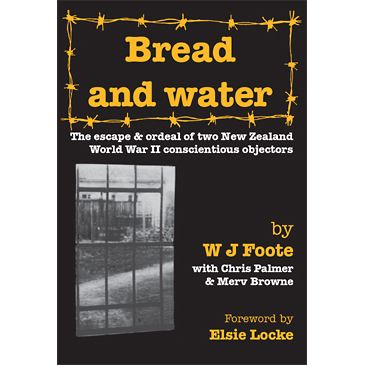
Free Audio Book – Bread and water by Will Foote – read by Philip Garside
Free Audio Book
Bread and water: The escape and ordeal of two New Zealand World War II conscientious objectors
By WJ (Will) Foote, with Chris Palmer and Merv Browne
Audio book read by the publisher Philip Garside
Click this link for the complete book in mp3 format
The link will take you to a DropBox folder where you can download individual mp3 chapter files or the complete book as a zipped collection of all the mp3s
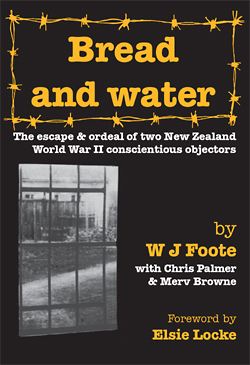 New Zealand World War II conscientious objectors were treated harshly. Imprisoned for their pacifist beliefs, Chris Palmer and Merv Browne were held in military defaulters’ camps in the central North Island. To bring conditions in the camps to public notice, in 1944 Chris and Merv escaped to Wellington. This classic book tells of their audacious adventure and consequent punishment.
New Zealand World War II conscientious objectors were treated harshly. Imprisoned for their pacifist beliefs, Chris Palmer and Merv Browne were held in military defaulters’ camps in the central North Island. To bring conditions in the camps to public notice, in 1944 Chris and Merv escaped to Wellington. This classic book tells of their audacious adventure and consequent punishment.
The print book which we published in 2000 is now out-of_print, but you can Click here for the Kindle and ePub eBook editions
We have published three other books about Christian pacifists and overcoming violence in New Zealand
|
History of the New Zealand Christian Pacifist Society By David Grant Print BookeBooks |
Overcoming Violence in Aotearoa New Zealand A New Zealand contribution to the WCC Decade to Overcome Violence Print Book |
A New Zealand World War II Conscientious Objector’s Story By Allan Handyside Print BookeBooks |

Free Sample Chapter – Greens and Greys by Rosalie Sugrue
Dark Encounters
Year two rolled on. Christchurch and College continued to fascinate and educate. Smug in senior superiority we hardened hostellers, swaggered around the first years oozing worldly wisdom, and tempting fate with blind dates, risqué adventures and dabbling in the occult.
To be precise, we organised a couple of dance dates, a set number of girls from our hostel and a boys’ hostel, and lucky-dipped for partners. Esther is still married to the guy she met on one of these dates 50 years ago.
* * *
Two late passes per week were the maximum allocation, an 11 o’clock, and a 1:30. 1:30 seemed pretty liberal but there was a catch, it couldn’t be taken on a Saturday. Being the Sabbath there was a 12:15 curfew. The hostel was locked at 10:30 each night by the ‘duty Deac.’ Then the poor Deac had to stay awake and open the door for those on late passes.
Talking was my downfall. 10:30 creeps quickly during a good discussion. If caught missing the deadline, late passes were suspended.
The three fire escapes were raised five feet from the ground. An ineffectual twist of barbed wire decorated each bottom rung. An apple-box hidden in the hedge provided the initial boost. Life was easier for the girls who lived downstairs, several windows gave easy access, but we upstairs dwellers couldn’t risk creaking up the stairs past Miss P’s room. I could rely on Esther to cover for me, as I did for her. I didn’t do it often. I was uneasy about breaking rules.
That year it was fashionable for boys to prove manhood by bathing in a girls’ hostel and souveniring the plug. Only one plug went missing from our hostel but our lives were spiced by the continuing hope of intercepting some intrepid, naked intruder. At that time only a séance held more fascination.
* * *
Chopsticks belts from the piano, a sure sign Miss P is out. The common room fills. A wireless is plugged in and turned up. Maureen and Vera stop murdering the piano and join the twisters. Bodies gyrate to the end of the hit parade then someone suggests a séance.
Pious Patricia wonders if it is right. “We shouldn’t dabble in witchcraft. You know, it could be evil,” she falters.
“Witchcraft be blowed! All the hostels are doing it,” says Maureen. “My mate Theresa told me the Rosary House girls are really into it. They haven’t made contact with the dead or anything but they sometimes get answers to questions and its super spooky.”
“I don’t know if I’m game,” mutters Twitch.
“Don’t be batty, it is only a game,” says Pam.
“My Welsh Aunt believes in it,” says Jo.
“Ridiculous! Stuff and nonsense for the gullible,” scoffs Esther as we scatter to find torch, glass, pen and paper. Smug Esther deigns to watch.
Gullible eh! An idea sprouts. I move to the telephone in the passage and dial the number for Bishop Julius, the Anglican hostel, a mere five-minute bike-ride away. A brief conversation takes place with Beth Brown, ex-Secret Six member, code number 6.6.
The lights are out when I slip back into the common-room. Jo is pulling faces with a torch under her chin. “I heard you calling from the grave,” she wails. “Ask me what you will.”
“Can you act your age?” asks Esther.
I join the huddle round the alphabet-encircled glass. Pam is adding an opposing yes and no for speedy replies. Jo quits mucking around and directs the torch at the upturned glass. Muffled giggles snuffle to silence. Seven fingers rest lightly on the glass and slowly the glass takes on a life of its own. Questions are suggested. Yes, Maureen will pass the maths test. Vera will to get an A for her art assignment. No, there won’t be ice-cream for pudding tomorrow. Waipuna will win a beauty contest. Jo will have lots of lovers. The questions become more complex. Jo’s lovers will be foreigners. Pam’s boyfriend will propose before the year is out and she will have four children. “Is anything strange going to happen?” ventures Twitch.
The glass gathers momentum and sweeps like a dodgem-car. Yes, indicates the first curve. A dark stranger bearing strange tidings, spells ‘The Force.’
“Does the stranger have a name?” I ask.
B-E-T-H the glass replies.
With the lights on feelings range from spooked to sceptical. I take a philosophical stance and declare, “Anything is possible.”
“And how many flying pigs have you met?” inquires Esther.
Twitch starts to say something as the doorbell sounds.
“Someone for Molly,” calls the duty Deac.
“Who is it?” I call back.
“Someone called Beth.”
The gang crowds into the passage.
“Dark hair,” observes Jo with a direct stare at Esther.
“Dark hair,” echoes Twitch.
“Do you have a message for us, asks Jo, “Any strange tidings?”
“Strange tidings? You lot are totally strange!” Twitch has a fit of nervous giggles but is silenced by an icy look from the Stranger. “It so happens I did see that Matron of yours as I came through The Square. She was going into the picture theatre with a rather distinguished looking older-man.”
Shrieks of amazement are followed by a volley of questions but Beth has nothing more to say on the subject. “I have some special news for Molly, but there is something I would like to know?”
“What?” asks Pam.
“Why the pentacle?” Isn’t the pentacle a symbol of witchcraft?” All eyes follow the visitor’s gaze to a red star on the front door.
“Five points,” says Jo.
“Blood!’ gasps Twitch.”
“Your hostel is weird,” says the visitor. I’m not hanging around here. Molly, can you come for a coffee at The Cauldron?”
A few days later I return the favour, though my pentacle got no closer than the gatepost of Bishop Julius Hostel.
“Why didn’t you put the pentacle on our front door?” Beth asks, tucked away in our favourite corner of The Cauldron.
“I would have but…,” I doodle sugar into my cappuccino. “It has been a sweet week. Everyone is talking about Miss P’s distinguished gent, and even better, Esther pestered me for the news you brought. I told her I am likely to be given two tickets for West Side Story. She is doing everything I suggest – our room has never been so clean. And, she’s taken out a heap of library books on the occult. I skim them when she’s out. She thinks I’m some sort of authority and actually asks my opinion. Had I been caught your Matron would have told our Matron and the game would be up. Besides, I don’t care to incur Miss P’s displeasure – she was hopping mad over the lipstick on our door.”
* * *
Beth and I promoted a rumour that West Coasters are known for being psychic – caused by proximity to many ghost towns, we said. But I lost my appetite for dealings with the ‘other side’ in a major way. For this year too brought trauma – unbelievable and indelible trauma, the death of my father – Ernest Austin Sinclair, in his 54th year, at his home, suddenly, no suspicious circumstances (they might as well have put it in capital letters BY HIS OWN HAND) leaving a wife and three children.
* * *
Dad hasn’t come in for tea. It is a ‘Dad and Dave’ night. Along the Road to Gundagai blares over the airwaves. No one likes missing the favourite serial, especially Dad. He grew up on a farm. I hold the button longer this time. The intercom is Dad’s own two-valve invention that links his shed with the kitchen. It works really well, but not tonight apparently. Nathan runs out to the shack and finds him.
26th of August, the day after Nathan’s 15th birthday, a never to be forgotten date. Dinner the night before had been the traditional family party – cake, candles, presents, followed by board games. Dad had been on a winning streak, winning two out of three games of Cluedo.
Dad didn’t use rope, dagger or candlestick. He used electricity and water. He didn’t leave a note. An accident? He was meticulous to the nth degree. We couldn’t even pretend. The coroner’s report in The Grey River Argus took care of that.
How could anyone do such a thing? How could he? Why did he do it? It was so stupid! So hurtful… so wrong!
My own father, a happily married man; he had no vices, no worries, a good job – supervisor of the telephone exchange. No one can understand it – police, neighbours, workmates, or Labour Party associates.
Why Dad, why? You didn’t have enemies. You didn’t owe money. You didn’t drink, smoke, or gamble. You loved us and we loved you. How could you do this to the people you love. If something was going wrong for you why didn’t you tell us! We would have helped. You know we love you. Didn’t we tell you… maybe we didn’t tell you? If we didn’t tell you it was because we thought you knew.
Something must have been going very wrong. But whatever it was, how could we be better off without you? We need you. Mum needs you. It hurts. If only there was a reason. If only you had left a note or given some clue. If only!
* * *
Dad left everything in order, possessions tidy, bills paid. Luckily it was the start of the holidays, we had time to cope. Luck… or carefully planned? Dad was meticulous by nature and knew the Scriptures. “He set his house in order and hanged himself.” 2 Samuel 17:23.
Is he safe on that Beautiful Shore? The question was never voiced. Everyone was kind, especially the church folk. Mum wrote copious grateful-thanks notes. We kept out of her way knowing she was stressed-out on humiliation. The church had standards. Not that anyone said so but the words sat silent on each blank sheet – ‘Suicide is a sinful and cowardly act.’
We suffered the classic symptoms of grief, since learned from magazine articles – shock, denial, anger, guilt, fear, hostility, plus an extra one – shame. Feelings weren’t named in those days. Our grief was silent, personal and self-blaming. That’s how it was – pain smothered to smoulder, cankering the soul until semi-forgotten.
A decade passed before we shared our silent guilt. Nathan regretted his adolescent indifference, but despite a full-on teenage lifestyle schoolwork and chores usually got done. He was a good all rounder, popular and enterprising – ice-cream boy at the pictures by standard five, a Press paper run at 14. I’m sure Dad was proud of him.
Mum felt she should have spent more time with Dad, but they had different interests. Separate pursuits suited their relationship.
I was convinced I’d brought trouble with the train crash. Rail workers were strong among the party faithful. I had caused a Greymouth man to lose his driver’s job. Even so our railway neighbour gave us a bag of coal and said he was really sorry, Ernie was a good chap, a good worker for the Party.
* * *
We didn’t talk about Dad much. Neither did anyone else. What could they say? The usual platitudes – a blessed release from suffering, the Lord giveth and the Lord taketh away, a terrible accident, safe in the Lord, his number was up, God calls his own, and so forth, just didn’t apply.
Dreams bother sleep, the old complicated dreams – Deaconess House, miles of passages, lost on a ship below deck, the three-headed dog, the steaming train plunging from grey gorge to grey hospital and always a bell ringing. And new dreams – me causing indiscriminate death or finding Dad sitting zombie-like in his chair, having to tell him he was dead and didn’t belong here; interpreting his hurt as betrayal.
In the absence of reason I searched for memories to hoard – conjuring up his slight figure singing in the garden, hunting for reading glasses, radio tinkering…treasuring special times in his shack – speaking into the microphone, hearing crackling replies from ‘hams’ in faraway places.
When I was ten Dad helped me build a headphone crystal-set, and tried to teach me Morse code. I never mastered it. Mum had though, back in courting days, when he was going for his wireless ticket. Dad told me they went on picnics and sent each other love messages with Morse keys; so romantic, and so unlike them.
Dad was a bit of a loner, being a non-drinker in our neighbourhood. He spent summer evenings in garden or shack, and winter nights listening to the BBC or reading by the fire – wireless magazines and Yates Garden Guide. Truth and Man Magazine stayed in the shack. Mum’s house was not to be sullied. She tolerated his taste in humour with mock despair and head-shaking as he chuckled over cartoons and booklets such as Pigs Is Pigs. His favourite funny was The Specialist, about a man who applied much thought as to the best location and decor for his privy.
I saved memories like shining magazine pictures but couldn’t dignify them with order and theme. I hoped for light but found only shadows, uncomfortable shadows. I recalled his gait, a slight limp – something I hadn’t noticed until a 12-year-old classmate commented, “How come your Dad walks funny?”
On ANZAC Days my father’s poppy bled in solitude on his dark suit. He stood with head inclined as medalled peers paraded. Maybe not drinking helped! My dad could never share the camaraderie of contemporaries embellishing war yarns at the RSA.
I glimpsed the unspoken shame of polio; his hating of sports day at school, compulsory age races, where he always came last, a deliberate tripping, broken arm and weeks of plaster and sling. He told the story lightly saying his big mistake was breaking his left arm, had it been the right he could have got off writing as well as sport.
Nathan appeared to get over it. He was a logical lad, not given to sentimentality. “A great support for your poor mother,” remarked those who had to say something. He wore the responsibility of garden, lawns and firewood as a mantle of maturity. I was proud of him, and didn’t suspect cloaked feelings.
Mum missed Dad but she was a woman of inner strength, not one to weep, or accept ‘pills to help’ rumoured available from the doctor. Devout Christians had to cope. To be seen not coping was a betrayal of faith.
Despite clearly defined co-operative roles my parents were independent souls. Mum learnt how to write cheques and deal with insurances, and lengthened her formidable list of church and community good works.
I returned to Deac House for the final term and every time I looked at my radio I thought of my father and wondered why.
* * *
Years later Danny told me why. On his last visit before emigrating, Dad and Dan had talked as never before. They’d hugged and cried. I’d never seen my father cry, nor hug a son past baby stage. Danny told of his love for Archie and the problems of leading a double life. He shared feelings of rejection and coming to terms with being different. In return, Dad bared his soul, confessing a lifetime of feeling inadequate. He didn’t want to cope with physical problems any longer. Life wasn’t worth it. Inadequate! Physical problems? Dad never complained about anything!
True, Danny agreed, Dad wasn’t inadequate and never complained. He seemed fine but polio left him with deteriorating weaknesses. Nagging arthritis pain wore him down. He gave it a name, CC, Constant Companion.
Then, I remembered Aspro boxes…Dad carefully unwrapping white pills and rolling the waxed-paper strip, just something he did, like shaving.
Danny told me Dad was frustrated with his eyesight – myopic all his life, dealing with additional reading glasses was almost beyond bearing. Surely not! Lots of people need two pairs of glasses. Danny equated increasing disability with loss of self-esteem, said anyone can cope with one problem, multiple problems compound and knock the ego. He reminded me of Dad’s slight hearing loss, not a problem one-to-one, but enough to make him feel foolish in some group situations. Dad feared it might affect his job. However, these inconveniences merely contributed to Dad’s private misery. The real problem was too humiliating to talk about, too humiliating to write about – a bowel condition, prognosis, loss of control. He didn’t want anyone to know.
Danny understood. He had considered taking his own life. He felt he’d been cursed until he met Archie. He’d tried talking Dad out of it but had said goodbye, just in case, and agreed not to tell anyone. Dad told Danny he loved us dearly. We had all brought him joy. Life had been good. He intended it to stay good.
* * *
Click here to order your Print or eBook copy
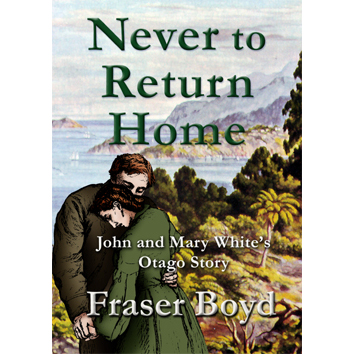
Free Sample Chapter – Never to Return Home by Fraser Boyd
Part Three — John and Mary
Chapter 13
When John had been working on the farm for several months, he came in from milking one Thursday morning reflecting that these monthly trips to town may become more interesting in the future. Mary, the girl from McGuiness’s farm, had said in the course of conversation at the kitchen door that she would be going to the city next Monday with her employers, and how wonderful it was to have employers who were willing to let her take advantage of this opportunity. She had said before, bubbling over with enthusiasm, how generous they were in allowing her to share in some of the family activities.
John wondered why he hadn’t met Mary accidentally on the three trips he had made to Dunedin so far, but hoped that he might be able to engineer a meeting. He would give it some thought in the next few days.
As Mary had been in Portobello for much longer than him, she might be willing to show him around more than Michael did. Michael was good company, and had helped him immensely on both the farm and with local social customs, but had his limitations. John knew that respectable women didn’t go into hotels in New Zealand, which meant that he and Mary would have to find somewhere other than the tavern to sit and talk. John said nothing to the others, but wondered how he might find Mary in Dunedin, without making his intentions the subject of good natured mockery by Michael and the others.
What John didn’t realise was that people had been watching and waiting for the next step in the relationship. Even after such a short time, people could see what was going on before John had even recognised that there was a relationship.
Mary’s parting remark after she had got her billy filled with milk, had been, “see you all in town.” John hoped that that would be so, but didn’t have the courage to suggest a meeting.
The McKenzie and McGuiness wagons set out at about the same time, but not together. John was thinking about how he might accidentally meet up with Mary. Mary was thinking that she could meet with Jane, have lunch, and talk over yet again what had happened to them since the voyage out. This never palled. Mary was finding that Jane had a much narrower existence as a lady’s maid than she did, which meant that Jane did little except cater to the personal desires of her mistress. There were no children to brighten the place, and when her mistress decided to put on an afternoon tea for the neighbours, it was Jane who did all the work. “And somehow, something always goes wrong,” Jane had said with a shudder at a previous meeting. “Last time I had to bake in a hurry, then rush out to get cream, and whip it up and put it on the cakes, which turned out not to have cooled down properly. The cream ran everywhere both on the tray and on the clothes of the few people who did have the courage to try one.”
Unlike Jane, Mary had been able to learn a great deal about running a house, such as cooking and sewing some of her own clothes, and was respected by the whole family as a person. She was called on to look after the children when required, allowing Mrs McGuiness to visit her neighbours from time to time. She was also willing to get the milk each day and run various other errands. So far as she knew, she had not made any serious mistakes. Her energy and capacity for work was enormous, and she was becoming much more than just domestic help.
Jane, on the other hand, was finding the whole business constraining to say the least. “I came out here to broaden my horizons,” she told Mary, “but I am finding that my employer is telling me what to do in such great detail that I’m not able to try anything new, or use my brains to make things easier or better.”
“Wait until your year is up,” Mary counselled, “by then you will know a bit about New Zealand and be able to pick and choose who you work for and what work you do.”
Mary was also growing in physical strength and self esteem. While still conscious of the limits of the relationship between her and her employer, she had become a person with whom Mrs McGuiness was happy to discuss matters relating to household management, and how best they could work together. On the wagon that Monday morning, Mary started to think that she might have the skills to run a house of her own. She was well aware that she was doing things that were the exclusive preserve of Mrs McCann back home, and many more that the senior domestic staff in the Hanratty household guarded jealously as their own. She was coming to realise how cosseted the upper classes were in her homeland, and probably in many other places, including no doubt parts of New Zealand.
While aware of John’s interest in her, Mary was not really sure if she felt the same. As she learnt more about running a home, she often thought about where that home might be and what it might look like, and even who might live in it. Several men had approached her with offers to “walk out” together, but she wasn’t ready and had shown no interest in them at all.
Mary could now discard ideas about this country that she had formed in Ireland, like protecting her home against savage attacks, or having a little house in the forest where you had to be careful before you went outside in case there were bears or wolves lurking. She now understood a little more about the Maoris. There were some horrendous stories coming from up North about the battles between the settlers and the Maori people, but there was no strife in this area of the country for anyone to worry about. There were doomsayers around, who talked of the need to go home before we all get our throats cut, but nobody paid much attention to them.
The two men did their shopping, and the tasks that Mr McKenzie required of them. After they took their packages to the stables for safe keeping they had nothing to do for the rest of the day. Michael, as always, suggested the tavern, but today John was interested in the many building projects around the town, and wanted to study them more. He decided to have lunch with Michael, then excuse himself for a couple of hours until it was time to go back to the stables for the ride home.
Michael mentioned to John that they would see more of their neighbours in Dunedin than they ever would in Portobello, except at times like haymaking. “Everyone goes to town on that Monday,” he said. “A thief with a fast horse could rob just about every house on the Peninsula on the first Monday of the month.”
“Mondays,” mused John, “seem to be very important here. Maybe even more so than the Sabbath.” He hoped that today might be the day when he would meet a particular neighbour.
After a drink or two and lunch, John suggested that they part company for the rest of the day, but somewhat to his dismay Michael said, “I would like to take a walk around with you if I may. I should find out more about this place too. I haven’t really looked at it very much.”
As they left the hotel and turned left down the street towards the wharves, John nearly missed Michael’s remark, “There’s that Mary from McGuiness’s sitting in a tea room with a friend.” By the time he had woken up to what was going on, John had been steered to the open window of the tea room and both men were being introduced through the window to Jane, “my friend off the ship. We meet here on Mondays whenever we can.”
John was tongue tied during the introductions, and quite uncharacteristically had little to say, until Mary asked, “Have you men had lunch?”
“Yes, indeed,” said Michael. “We have eaten well and done all the shopping we needed to. What are you planning to do now? What about a walk up the hill?”
This all came as a surprise to John, but he soon agreed, and somehow the couples just paired off, with John and Mary in the lead. John and Mary were puzzled by how slowly the other two walked. No matter how much John and Mary slowed down, the other two never caught them up. In the end John and Mary set their own pace, and the two young Irish people found they had a great deal to talk about.
Michael confided to Jane that what they were seeing on the road in front of them looked very much like a good match. Jane confided to Michael that she was delighted to meet John, about whom she had heard so much from Mary. She was, though, disappointed that it looked as if she was going to lose her only friend in Dunedin.
“Apart from my Mondays with Mary,” Jane said, “I have little time off and don’t have the opportunity to meet or make other friends.”
Michael was not sure if this remark about a lack of friends was a hint or not, but settled it with the ungracious comment that he felt that he had too many things to do with his life to tie himself up with a woman just yet.
As they sauntered through the town, into areas John hadn’t previously seen, he was surprised by the how many of the wooden buildings were built in a style that looked as if they were trying to pretend that they were stone. The one that stood out most was Knox Church, perhaps the biggest wooden building he had ever seen, complete with a spire. “There just has to be work here for someone who knows how to use stone,” he thought, and continued to study these wooden buildings to see if he could understand their design and construction. He knew he was a long way out of his depth. “I might get there in the long run,” he thought regretfully, “but for the moment maybe all I am good for is those rock walls and shaping stones in the quarry.”
Mary was aware that she didn’t have John’s full attention, but accepted that there were so many things for him to take in on his exploratory visits to Dunedin that he couldn’t focus on any one thing for long. While she didn’t want to be tied down, Mary was deliberately taking steps into this relationship and eagerly looking forward to getting to know John better.
Neither John nor Mary had any experience of “walking out” as they had observed with older brothers and sisters and their friends. So, much of their talk was about work on the McKenzie farm or in the McGuiness household, especially the McGuiness children, or John’s thoughts about the use of stone as a building material. Inevitably, Ireland also came into the discussion, and the differences between working at home and working here in New Zealand. Mary made John laugh when she told him of her first day working on the farm, and how the men had tried to turn her into a farm labourer almost before she had set foot on the shore.
She commented on how she found her present job much more stimulating than the very narrow life she had led as a housemaid in Ennistimon. They both delighted in having this little bit of real leisure time to explore ideas and their personal stories, rather than a necessarily brief and public early morning, “How are yous?” when Mary was getting the milk.
“It’s the people,” John said many times over. “Here, labourers are as good as their masters if they put in a good day’s work, and masters are as good as the labourers because they also put in a good day’s work. I doubt that I’m going to make my fortune, but I like it here. There is so much I can learn and I am being given the opportunity to do so.”
Mary thought she knew what John meant. “Like Mrs McGuiness doing the cooking, and how we share jobs rather than me working from daylight to dark and never finishing.”
“People seem to change when they come to a place like this. They have to, to survive. There’s no way they can sit back, because success doesn’t just happen. I like the way there is no gentry as we knew it. Everyone is dependent on someone else.”
They reached a vantage point where they could see Dunedin laid out below them. Neither were sure what the name of the hill was, but it appeared that the citizens of Dunedin saw it as an obstruction, as there was a cutting through it, and men were working to remove the east side of the hill. They later learnt that the rise was known as Bell Hill, and was seen as a major obstacle to the development of the city to the south. It was being removed so that a road to the south could be built right through it.
From this position they could see some of the smaller settlements on the southern side of Dunedin, such as Green Island and Tomahawk. Along the harbour edge to the east they could see Port Chalmers with its wharves, warehouses and the tangle of masts. After commenting that Green Island wasn’t an island, John asked Mary about the name Tomahawk. Mary said she had learned that the name Tomahawk was given by the Maori people, a tomo being a kind of cave. John was interested to see that Mary had such good local knowledge. When he remarked on this, she told him about her introduction to the local natural environment, and how the children got so excited about the things they could do in the bush and on the beach.
“They give the children time to be children here,” Mary said. “At home it was work from daylight to dark, and very little fun, no matter how hard I tried. Here, even though I am sure they are just as busy, the children get some time to play every day.”
“The excitement hasn’t died down either,” she told John. “The children still go exploring through the bush and around the coastline, and every time they bring back something that no one has seen before. We all study it and try to learn what we can about it. One of the men who sometimes comes to our place,” John smiled at the use of the term ‘our place,’ “is studying New Zealand plants, so he can often help with a name and a story about how the Maori people use it.”
She went on to explain to John some of the things she had learnt from the children about kelp on her very first day at Portobello, and what she had learnt since about the healing properties of plants. John found this fascinating, partly because he did actually find it interesting, but also because he could see how Mary had adjusted to this new, strange country and very different way of life. He wondered if he was ever likely to get as excited as Mary about such things, although he hoped that he would get as involved in the life of the colony.
Mary said that the McGuiness children were soaking up all the new experiences they could, and sharing them with anyone who had the time to listen. She commented on how much better this real life learning was than trying to learn in the little old school back in Ireland. “Because,” she said, “at least what I am learning here is about real things. You can use a lot of the knowledge, and what you can’t use is fascinating anyway. I used to think that everywhere was like Ireland, and what wasn’t like Ireland was probably not as good. Now I know better than that.”
It occurred to John that, for all the talk about them, he hadn’t seen a lot of evidence of the Maori people. He found it interesting that European settlers were adopting parts of the Maori language that suited them, like the mysterious word “forry” he had encountered on his first day. “I find the idea of these people interesting,” he told Mary, “but have not yet even seen one, let alone had the opportunity to meet one. And everyone here seems to speak well of them. They are apparently not the ‘savages’ that we were given to believe back home.”
“Everyone does speak well of the Maoris,” Mary said, “and I have seen a number of them, usually working as hired labour or around the streets of Dunedin, although I believe some of the Maori women work as domestics. The thing that I wonder about them is their tattoos,” she continued. “At first I thought it was paint on their faces and hands, but I have been told that the patterns are actually carved into their skin, with a dye forced into the cuts. Getting them done must be very painful.”
John, by now, had lost himself in the landscape. It was the first time he had seen the whole area in which he lived. From the top of Bell Hill he could see the flatter harbour side areas, where people were clearing parts of the bush to create both grazing and planting land, and closer in to the city, housing for the merchants and professional people. He noticed the wharves and could get a better idea of their development from this vantage point. He wondered whether the development of the port might mean the end of Port Chalmers as a centre of business. He could also imagine all the people hard at work down in Dunedin while he was enjoying his afternoon off way up here.
Could he really pretend that he was a builder in stone and get away with it? Maybe he could find a tradesman to work with? That would give him the training he would need. He would soon be found out as a fraud if he tried to pass himself off as a tradesman. His walk around Dunedin had shown him how little he knew about actually building in stone. Taking masonry up as a trade looked like a good idea, but maybe it just wasn’t practical, or even sensible.
He didn’t want to start an apprenticeship at his age. Did they even have apprenticeships here in New Zealand? Maybe he could get away with his limited trade skills if he worked by himself? He could then take on jobs which he was confident that he could do, such as stone walls, and grow his skills gradually. Where could he ply this trade, whichever option he decided on? Certainly not in Portobello, there just wasn’t the work. It would need to be a city like Dunedin, or at least a town like Port Chalmers.
Mary could see that he was dreaming of either his past or his future. So she concentrated on her dreams and what her future might be, and how it might change because of meeting up with John today.
Mary and John had become so immersed in their own thoughts that they had completely lost touch with the other two members of the party. Then Michael suggested that it was time they went back down. “We don’t want to hold up our people,” he said. He added a comment that someone had to take charge of things while others were dreaming their lives away. This caused a giggle from Mary and a shy smile from John.
As they reached the bottom of the hill John found himself wishing that something might happen to keep him and Mary together for a bit longer, but this was not to be. When they arrived at the stables the McGuiness’ wagon was harnessed up, and the family was climbing on board. Mary quickly joined them. After goodbyes, Michael said, “Come on John, we will harness up, our horses are better than theirs. If our family aren’t too long we might even beat those people home.”
John helped get the horses out and into their harness. Just as they were completing the job the McKenzie family arrived, complete with parcels, with the young children sucking on sweets and smearing them liberally on their faces and clothes.
In both wagons the journey home was quieter than the journey out, as, except for the apparently irrepressible Michael, they were all tired. The children rolled themselves up in blankets. Everyone else sat, more or less in silence, thinking about the events of the day. For a few minutes Mr McKenzie discussed with the men the difficulties of obtaining supplies, and noted that he might need to see if any of their neighbours had surplus hay because there was a shortage on the local market. John offered the throwaway comment that he hadn’t seen a lot of wet weather so far, so there should be a lot of hay around. Nobody was really interested in answering, except to say that more land needed to be cleared so they could grow more grass. The men warned John that it would not be long before he saw some real weather.
John mused that he had enjoyed a walk up a hill without begrudging the loss of an afternoon at the tavern. He had gone down to the ‘Portobello Tavern’ with Michael a few times since he had been here, but wasn’t sure about this New Zealand beer. It seemed a bit too different to what he was used to. He did, however, realise that anything new is an acquired taste, and was happy to work to acquire it. However, the Irish pub he had been taken to in Dunedin had its own version of Guinness which he found was much more to his taste than the local beers. A day a month was not sufficient for him to really sample the local brew, investigate the layout and form of the buildings in this new town, and now, court a young lady.
John was also looking forward to his next turn on the milking, in a little over 12 hours’ time.
Click to Order eBooks or Print books
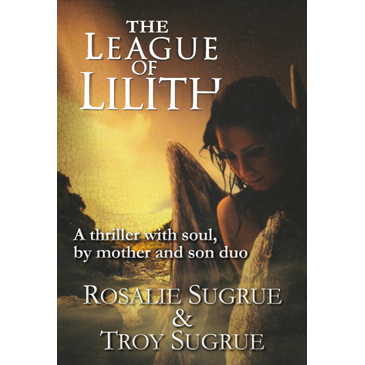
Free Sample Chapter – The League of Lilith
6 — Ruth
Tuesday, 10 March
“Now it came to pass in the days when the judges ruled that there was a famine in the land … So begins of the Book of Ruth.”
Kat slides in beside Jen. “Got held up,” she mutters.
“In ancient Hebrew literature, ‘There was a famine in the land’ equates to our ‘Once upon a time’ — a phrase that indicates a story will follow. ‘There was a famine in the land’ was a way of moving a character from where they were to somewhere else, the humdrum of ordinary life being no basis for a good story. ‘There was a famine in the land’ catches attention. The situation requires resolution, and thus a plot is born.”
Jen wants to think on this but can’t because Kat is whispering again. “Excellent Parts has a prime seat today.”
Jen notes Darlene scribbling notes in the centre of the front row, and wonders if today’s blue t-shirt bears a logo. She also wonders just how excellent the girl’s parts are. It is so effortlessly easy for the young.
“This is a story of three strong women making decisions for themselves. Sixty-five percent of the Book of Ruth is dialogue. With speech being, as it is, in the present tense, the action is pulled into the now. This increases the liveliness of the characters. In a time when women who could not claim a father or husband disappeared, here is a remarkable story of strong women, decision makers, women taking charge of their own destiny. It is likely that this story was originally told to women by women. It is the one Bible book in Scripture that may have been developed by women.” Sarai moves to the whiteboard, marker poised. “What are the ways this story can be read?”
“A love story,” ventures Ms Serious.
“Why?” asks Sarai.
“Verses from Ruth are often read at weddings.” Philippa Tombs’ father is a member of the University Council. Philippa takes her studies seriously.
“As history,” volunteers the guy who isn’t Steve. “It is set in a defined time, when the Judges ruled the land.”
“Loyalty and generosity,” pipes up Darlene. “Ruth was loyal. Boaz was generous.”
Sarai’s direct gaze bores into the Maori student. “Miss Tainui?”
“Survival — marginalised women struggling against the odds.”
“Quite so. Any other suggestions?”
The class remains still. Sarai returns to the lectern.
“Ruth is an exceptional book in many ways and not least in that it is the only book in the Old Testament without a word of condemnation for anyone. Beginning with a famine the text moves from the barrenness of Moab, its barren land and its barren women, to the renewed fertility of Bethlehem, a good harvest, marriage, and the fertility of a son. The first intended audience would have been shocked to hear of a Hebrew couple moving from Bethlehem to Moab, and worse, allowing their sons to marry Moabite women. The tribe of Moab originated from incest.
“Naomi is widowed — and justly so, in the minds of the listeners. With few options, like the prodigal, she decides to return home. Her daughters-in-law start to go with her but she reminds them they have mothers of their own and the possibility of remarriage. The women weep, kiss and cling. Orpah obeys Naomi’s wish and returns to her mother’s house. Ruth utters a speech of undying loyalty, to which Naomi has no response.” Sarai considers the faces before her. “The text implies they walked on in silence. What possible reason could there be?”
The students lower their eyes, each hoping they will not be cornered. Unfazed, Sarai continues. “Chapter one ends with the tantalising words, they came to Bethlehem at the beginning of the barley harvest. Soon Ruth is gleaning in the fields behind the barley reapers. Naomi has directed Ruth to the field of a kinsman. The Hebrews considered all foreigners promiscuous but Moabites despicably so. Naomi does not warn Ruth about the local men. Does Naomi see molestation as a way of acquiring a husband? Was a Moabite daughter-in-law an embarrassment to an Israelite from a land-owning family? The traditional view is Naomi harboured the hope that Boaz himself would notice the good-looking young woman, as indeed he did. He even kept a paternal eye on the stranger, suggesting she stay near his female workers and drink from the well-water drawn by his men — an interesting reversal of the usual Biblical male-female meetings at wells. Name one?”
Jen forgets to avoid eye contact. Luckily Rebekah comes to mind. Kat supplies Rachel. It is her grandmother’s name and her story has stuck.
“Any others?”
“Zipporah, wife of Moses,” says Darlene.
The ‘excellent’ reply causes Darlene to hide her face in her hands.
“Boaz,” resumes Sarai, “invites the foreign woman to share his own bread and wine. This is tantamount to welcoming her into his family. Loyal Ruth keeps some of the food offered her to take home to Naomi. After the meal Boaz instructs his reapers to leave larger than usual gleanings. In chapter three Naomi masterminds a plan and Ruth appears to be a willing participant. At the end of the harvest party a merry Boaz lies down on the hay and Ruth curls up at his feet. Feet as used here is a biblical euphemism for genitalia. Boaz commends Ruth for not going after the younger men and spreads his cloak over her — more euphemistic symbolism.
“After the threshing-floor incident Ruth is no longer described as foreigner, servant or handmaiden. Boaz calls her a worthy woman. Naomi calls her daughter and the narrator calls her woman. A closer relative than Boaz is willing to honour the law regarding widows and buy the field owned by Naomi’s husband, until he finds it has a condition attached. A condition imposed by Boaz: with the land parcel comes the foreign woman. The kinsman has no wish to marry a Moabitess and forfeits his claim. Thus Boaz is able to legally acquire both the field and the woman.
“The matriarchs of the town are generous in their good wishes. Their blessings make references to Leah and Rachel. We know skulduggery was rife in that household. They also express the hope that Ruth will be as Tamar, presumably a fertility wish, as Tamar bore twins, the result of seduction and trickery. The text implies that Naomi’s friends know and approve of what has happened. The harvest-hints of fertility come to pass: Boaz and Ruth produce a child, whom the women call a child born to Naomi. How might Ruth feel about this? It is the women who name the baby: Obed, meaning sought-after. Baby Obed becomes the father of Jesse, who is the father of David. The child of a Moabite woman is destined to be the grandfather of King David. The greatest of Israel’s kings was not of pure blood! Set against the barley harvest, the Book of Ruth carries a premonition of David’s reign being blessed with fertility and plenitude.”
Sarai returns to the whiteboard. “Ruth may be a testament to loyalty and generosity, but also to … ” she writes compromise. “The story is not a simple tale set in the time of the Judges.” Non– is added to historical. “Its content is political and devised at a later time, possibly during King Solomon’s reign. Placed here it explains the importance of the genealogy connection to King David, as it could support the international marriages of his insatiable son, Solomon. If written, as is considered more likely, during the time of Ezra and Nehemiah this story is protest literature. Post-exilic laws enforced the divorce of all foreign women. Imagine that!” Sarai’s arms spread with visualised horror. “Families torn apart, women and children driven out with no one to provide for them.” Her expression is so dramatic a collective shudder ripples through the room.
“Are there other ways of reading this story?” asks the rhetorician, and answers, “Of course there are. Ruth speaks the language of Covenant Israel. She denies her own culture. The subscript could be an underlying goal of turning Moab into Israel.” Sarai adds assimilation then propaganda to the list. “But perhaps it is also a personal story.” Love story is underlined. “Not a story of personal fulfilment, but rather the story of a young woman prepared to do anything for the one she loves.” Sarai twirls back to the board, writes, then exits the room. Her final red-lettered words are unrequited love.
As they file out Darlene stops in the lobby, apparently lost in thought. Percussionists usually do it standing announces her shirt. “Hullo, Darlene,” says Jen, deliberately disturbing her reverie, “are you a percussionist?”
“No,” Darlene looks blank. She gives herself a slight shake and follows Jen’s eyes to the logo. She smiles. “I’m a cellist. The youth orchestra is fundraising with these t-shirts. I’m majoring in music. This is an interest class for me and I’m really enjoying it.”
“Me too,” says Jen.
~ ~ ~ | ~ ~ ~
Kat arrives at the motel early. She doesn’t usually work Tuesday afternoons but has a new client to fit in. She decides to take the opportunity to check out the Ruth story. Is it a love story between an older man and a young woman, or is Ruth a lesbian? Kat has no leanings toward lesbianism. Such words were not spoken in her grandmother’s house, but it was known around school that such a person was running a business in Hokitika. The kids weren’t too sure of the facts and there was confusion between lesbian and transgendered.
City life had broadened her education considerably. A friend in the sex business had suggested she have a go at tipping the velvet but it hadn’t turned her on. Didn’t take long to discover Christchurch has lots of queers. Kat quickly concluded that, like in all minority groups, some individuals are nice and some aren’t. As she said to Jen, Darlene seems a Decent Sort of Dyke. Both had grinned at the alliteration, and since then refer to her as Triple D, though agreed it doesn’t describe her bra size.
Kat had thought homosexuality a modern thing but Jen maintained the ancient Greeks wrote plays about it, so presumably all the ancients were into it. Jen had related that back in her Bible Class days the kids used to snigger about King David being bisexual, he was a great one with the ladies but the love he had for King Saul’s son Jonathan was described in the Bible as ‘passing the love of women’ — what else could it mean?
After rereading the four-page Book of Ruth, Kat feels the ‘noble-older-man-meets-pretty-but-poor-young-woman’ story is the romantic tale she prefers. But Ruth is unnaturally keen to do all she can for her mother-in-law, to the point of not being her own person. If Kat had a child she wouldn’t let any mother-in-law claim it and name it. Any child Kat gave birth to would be hers to the full.
A knock causes her to shove the Bible back in its drawer. Why do they come early? She admits the new client and is charmed by his easy casual manner. He gives his name as Fish and looks at her with warm appraisal. “You’re a good-looking chick, Amber. Delighted to meet you,” he extends a hand and gives hers a no-nonsense squeeze.
Amber places his age at around 50, dark red hair, no sign of receding. Untamed beard, bright eyes, and lean figure. Clothes ‘flamboyant casual’, she decides. “Like the hat,” she comments.
Fish is in no hurry. “Good little pad you have here, discreet back street but not far from the city centre.” He sinks into an armchair, extends his long legs and gazes around. “Paintings, not prints, I like that. A view of the Waimak I would guess, not brilliant, but definitely original, probably done by an art student.” He stands. “See here, paint applied with a pallet knife, technique not perfect but good general effect.” He roams the room. “Homely ambience, that’s the thing about these older motels, lounge separate from the bedrooms, built for people not for profit.” He continues his tour. “A full kitchen and well stocked.” He looks at his watch. “Almost three, smoko time. Do you fancy a cup of tea or coffee? I’m sure you deserve a break.” His eyes flick from her cream carnation hair-slide to her cream high-heels, and he flashes a smile. Amber feels warmed. Perhaps I’m one of those women who is drawn to older men, she wonders.
“I sure could do with a cuppa,” says Fish. He glances at her with eyebrows raised. “No worries, matey, I’m in a quick-bonk mood. I’ll be gone by three-thirty.”
“Well, OK then,” says Amber. “I could go a coffee.”
She stands to get the jug but Fish is already filling it. “I did a stint as a motel cleaner once. A good bit of elbow grease has gone into this jug, I can tell you, and those copper-bottom pots. Look at them, beautiful! I can’t stand those crappy plastic jugs.”
Sometimes clients stall because they’re nervous, but Fish doesn’t fit that category — too relaxed. She wonders if he has some kinky fetish that he wants to discuss, but dismisses the idea — too open and friendly. Perhaps he genuinely likes a three o’clock cuppa.
“I haven’t been in Christchurch for a while,” he says. “Been down South Canty for a couple of years. I like to go bush every now and then, but you can have too much of good thing, I say. I like to maintain balance between the heartland and the hub.”
“What do you do?”
“A bit of this and a bit of that, I don’t believe in getting stuck in a rut. Hunting, trapping, shearing, painting, shop work, liquor barns … townie jobs are my form of retail therapy.” He grins.
“So Canterbury is your home?”
“I like Canty but no, I’m not fenced in by boundaries, my home is anywhere in the South Island. You wouldn’t catch me in that rat race up north. Hell no!” He pauses as though letting the horror of the thought digest. “Let the Wellington weirdoes and the Jaffas have it,” I say.
“I gather you don’t have a partner.”
“I’ve had many, my dear, but not for long. Women have this urge to claim a man. When I see the apron-strings looping my way, it’s time to sever the ties. I had seven kids last time I counted, could be more, keeping track is not my thing. I’m a free spirit and I like a good bonk. Let’s get on with it.”
He sweeps up her empty cup from the floor, dumps the two cups in the kitchen sink, swings back to the lounge, and drops his trousers. The pro hasn’t moved.
“Ah, you like a guy to shower. OK. I’m fast. I’m used to improvised water supplies. Be with you in a couple of secs.”
The pro appears frozen. Fish steps out of his trousers, takes two steps toward the shower and stops. “Hey, what’s up, kiddo? You’re not going frigid on me are you?”
Kat can feel her innards churning. The words don’t want to come. With effort she forms the sentence. “Were you at Ross in 1987?”
“Yeah, could have been around then, spent a couple of years in those parts. Oh God!” He cuts off and stares. “How old are you?”
Kat is on her feet, hands clenched to knuckle-white. “You don’t care about your kids. You don’t care about your women.” Her voices rises to a scream. “Get out!”
“Hey, hey, baby, baby, hush.” Fish hauls up his jeans with the speed of a shotgun order.
“Don’t touch me,” she fights off his attempted hug. “I’m not your baby. You never treated me as your baby when you should have.”
Fish steps back and holds up both hands in surrender. “It’s not like that. I do care. I’m just not fitted to domestic life. I’ve got these gypsy genes. I loved your mother, I really did, but I wasn’t ready to be a father. I told her but I couldn’t get her to believe me.”
“Children need fathers.”
“Yeah, yeah, but you had one, your mother took up with someone mighty quick, so I heard. I even came back to check. You were a cute toddler. She had a man, I wasn’t needed.”
“You didn’t pay any child support.”
“Well, my lifestyle wasn’t conducive to regular income and payouts. Keeping records isn’t easy with odd-jobbing, money under the counter, you know how it is. Bet you don’t declare all your earnings. Paintings often sell for cash. I’m not one for permanent addresses and keeping accounts.”
“Your slippery book-keeping kept my mother tied to man she didn’t love. And he hated me. George was a monster but at least he supported his own kids. You say I’m not the only one. I’ve a horde of half-siblings out there? You’re worse than George. You can bugger off, right now. Go!”
“Hey, hey, Amber … it’s not Amber is it … it’s … Katrina? You were my first baby girl. I’m sorry kid. I like you. I’d like to get to know you as a person. If you feel I’ve let you down I could try and make it up. If you ever want me, here’s my card.” He leaves a business card and a heap of $20 notes on the table.
Kat slams the door after him and locks it, sees the items on the table and dissolves into tears. After filling several tissues she dries her eyes and picks up the card. Kevin (Fish) Salmon, she reads, Artist. Bullshit artist!
Wednesday, 11 March
Kat spends most of the next day in bed. Yesterday’s meeting with her birth-father has left her drained. Part of her wants to process the reality of the encounter, but only a tiny part. Her dominant head-in-the-sand philosophy smothers what she doesn’t want to explore — keep your mind off difficulties, no point getting in a stew over something you can do nothing about. Gran’s homespun philosophy serves her well. Roll with the punches. Life’s what you make it. There is nothing a good sleep can’t improve.
Sleep is attractive, no clients to bother about today and there is the restaurant tonight. Waitressing has its pluses. She could manage financially without it but it is legit, a job she can name without explanation, a job that provides a measure of collegiality. Her self-employment is solo by choice. She has no intention of sharing her earnings with brothel or pimp. Waitressing is hard on the feet, the pay abysmal, but you know where you are and what to expect. Tuesday is the lightest of her three consecutive nights. Wednesday is unpredictable but she and Alison can handle it. Three table staff are required for the rest of the week.
Only four tables are occupied as her shift begins. Returning from the kitchen with a jug of iced water Kat is startled to see Sarai and another woman being ushered to a table by the maître d’. Well, I’ll be darned. Sarai here! And she’s got a girlfriend with her. Kat’s curiosity is aroused. She’s heard the rumours. How friendly are these two women? Could they be celebrating something special, or are they merely eating out? Kat skips explaining the menu to her couple and shortcuts to the blackboard specials.
“We’re celebrating 44 years of marriage,” the man beams.
Kat offers her congratulations and says she will fetch the wine waiter. Forty-four years, double my lifetime! Are they really as happy as they look? With the wine-waiter summoned Kat moves smartly to Sarai’s table and gives the formal welcome. “Good evening, I am Katrina your waitress for the evening.” Her smile has more twinkle than management requires.
“How lovely!” exclaims Sarai. “Pauline, this is one of my students.”
The other woman is younger than Sarai, Kat notices, but still old. Pauline easily meets her gaze and expresses pleasure. Kat is not surprised that they both order the vegetarian special. The friend, Pauline, has her back to the kitchen and is unaware of Kat approaching with the water jug. “Just like old times …” Kat hears her say. Sarai is smiling but Kat observes it as an indulgent smile. Sarai is sitting well back in her chair, whereas Pauline is leaning forward. Kat puts the jug down and sees Pauline’s wistful expression slide to mouth a perfunctory thanks. Mmm, thinks Kat, have I interrupted something?
However, when she returns with the mains both women are happily chatting over chardonnay. She keeps a wandering eye on them as she serves her other tables but detects not a hint of physical intimacy.
The anniversary couple are kneeing each other under the table. They are mildly tipsy by the time they decide to ‘go the full hog’, as the man puts it, and have the death-by-chocolate. “We didn’t have a fruit cake for our wedding,” confides his wife. “We both hate dried fruit. Under the posh icing was chocolate cake.” The memory sets her to a peal of giggles. Kat gives a polite smile, turns to do their bidding, and freezes. Standing by the maître d’ is … it can’t be … it totally can’t be … but it is … with a leggy young woman. Kat flees to the kitchen. This is something she cannot face. She gives the death-by-chocolate order and hangs around the kitchen, desperately hoping that Alison will arrive and she can ask her to serve that table. Alison doesn’t appear but the maître d’ does. “What are you doing? There are customers out there, move it.” Miss Hicks, as she demands the table staff call her, is not open to favours.
Kat edges through the swinging doors with her heart in her mouth. She sees Sarai look in her direction and heads for her table.
“Is something wrong, Kat?”
“Yes, actually there is.” How does she know? The rest comes in a rush. “I know you don’t want a dessert but please, Sarai, would you order something, anything. If I’m not serving you I’ll have to serve that table over there, and I … can’t face that man. I’ll pay for whatever you order.” The women look from Kat, to Fish, to each other.
“I could make room for an Irish coffee,” says Pauline.
“Why not,” agrees Sarai. “Two Irish coffees, and take your time, we’re not in a hurry. And Kat, we don’t need your money.”
~ ~ ~ | ~ ~ ~
Click here to order your Kindle or ePub eBook

Free Study Guide to Green, Ho! & Greens and Greys
A Free Study Guide by Rosalie Sugrue is now available for her books Green, Ho! & Greens and Greys.
The 9 page PDF guide is titled: A Novel approach to Bible Study: Personal Issues for Christians for Lent/Easter or whatever the Season.
Each of the 6 sessions looks at an important concept:
1. Values learnt in childhood
2. Faith in Youth
3. Sexual orientation
4. Suicide
5. Situation ethics and social justice
6. Mature faith
You will explore each issue by asking:
• Why did Molly do what she did?
• What would I have done in that situation?
Click this link to: Download your free PDF Study Guide


